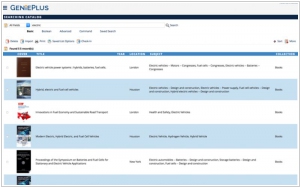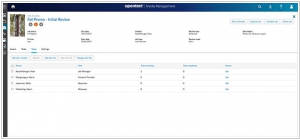Inmagic GeniePlus vs OpenText Library Management
July 24, 2023 | Author: Michael Stromann
6

GeniePlus is for special librarians who are increasingly asked to deliver more with less. GeniePlus enhances collection automation and management by integrating traditional library services with powerful knowledge management capabilities to help agile libraries overcome information discovery and delivery challenges.
3

Corporate libraries require a platform to manage digital content, electronic resources, multimedia, and print materials. OpenText Library Management is a web-based, integrated library system for managing library resources, including traditional and digital collections, and automating daily library operations. It provides the tools necessary to meet the rapidly changing requirements of the digital library.
Inmagic GeniePlus and OpenText Library Management are two distinct library management systems, each offering unique features to cater to the needs of different types of libraries.
Inmagic GeniePlus is a highly customizable and user-friendly system that targets a wide range of libraries, including corporate, legal, and special libraries. It excels in providing robust cataloging and search capabilities, enabling librarians to efficiently organize and access vast collections of information. GeniePlus allows for easy customization of workflows, user interfaces, and reports, making it a flexible solution that adapts to various library environments. Additionally, it offers integration with third-party databases, enhancing data accuracy and streamlining resource management. However, one limitation is that it may require some technical expertise for more extensive customization.
On the other hand, OpenText Library Management is a comprehensive library management solution designed primarily for academic and research libraries. It focuses on providing advanced tools for managing electronic resources, subscriptions, and serials. OpenText offers a seamless integration with discovery services, making it easier for users to access digital content across various platforms. Its robust analytics and reporting features enable librarians to gain valuable insights into library usage, resource allocation, and user behavior, facilitating data-driven decision-making. However, the advanced functionalities and features may make it more suitable for larger, research-focused libraries, and may be less cost-effective for smaller institutions with more modest needs.
See also: Top 10 Integrated library systems
Inmagic GeniePlus is a highly customizable and user-friendly system that targets a wide range of libraries, including corporate, legal, and special libraries. It excels in providing robust cataloging and search capabilities, enabling librarians to efficiently organize and access vast collections of information. GeniePlus allows for easy customization of workflows, user interfaces, and reports, making it a flexible solution that adapts to various library environments. Additionally, it offers integration with third-party databases, enhancing data accuracy and streamlining resource management. However, one limitation is that it may require some technical expertise for more extensive customization.
On the other hand, OpenText Library Management is a comprehensive library management solution designed primarily for academic and research libraries. It focuses on providing advanced tools for managing electronic resources, subscriptions, and serials. OpenText offers a seamless integration with discovery services, making it easier for users to access digital content across various platforms. Its robust analytics and reporting features enable librarians to gain valuable insights into library usage, resource allocation, and user behavior, facilitating data-driven decision-making. However, the advanced functionalities and features may make it more suitable for larger, research-focused libraries, and may be less cost-effective for smaller institutions with more modest needs.
See also: Top 10 Integrated library systems


